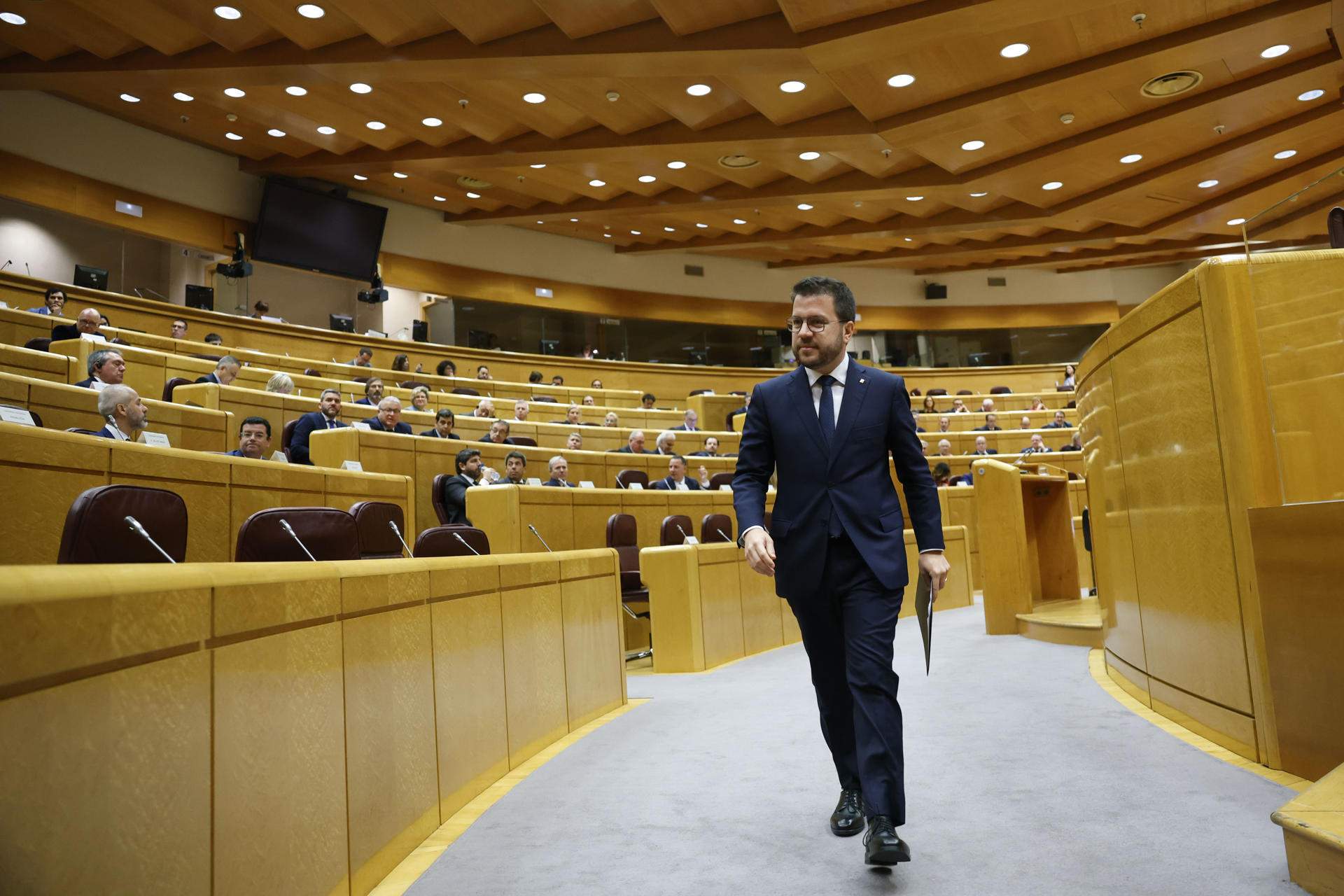President Pere Aragonès claimed this Monday that, after the amnesty, Catalonia deserves a referendum on self-determination and its own unique financing system. And with the consultation of Catalans to decide their political future, the same thing will happen that has happened with the law aimed at repairing the judicial persecution of Catalan independence supporters. That was the thesis that the president of the Generalitat defended this Monday in the Spanish Senate, before the upper house's committee on Autonomous Communities, in a session organized by the PP. The head of the Catalan executive began his speech by noting that Pedro Sánchez affirmed only two days before the Spanish general election of last July that under no circumstances would he negotiate with independentists for a referendum on self-determination or an amnesty law, and he end up yielding in the second. "The amnesty is no longer impossible and unconstitutional, as will happen with the referendum", said the head of the Republican Left (ERC) list for the Catalan election of May 12th. Amidst the electoral pre-campaign, he also recalled that Catalan Socialist leader Salvador Illa opposed an amnesty law in the first instance. "Catalonia does not believe that things are impossible", he added.
President Pere Aragonès in the Senate: "Today's debate had its origins in a question: 'Do you want Catalonia to become an independent state?' The will to carry out a referendum over the independence of Catalonia, which is legal, possible and necessary to resolve the conflict over sovereignty between the Spanish state and the Catalan people..."
The committee meeting held this Monday in the Senate was, in effect, the latest flag-waving session by the People's Party (PP) against the amnesty law. It was mere gesticulation, as it has no binding character and does not affect the passage of the law through the chamber. "We are here for the final phase of the approval of an amnesty law that we were told would not be possible", said Pere Aragonès when it was his turn to go to the Senate rostrum. Since the speaking order depended on the date on which autonomous statutes were passed and the Basque leader Iñigo Urkullu was not present, it was, in fact, the Catalan president who spoke first.
Aragonès recalled that many Catalans, from Carles Puigdemont to Ruben Wagensberg, had had to go into exile since the moment that Spain used batons to beat Catalans who wanted to vote in the October 1st referendum. "That day, Spain revealed its failings", he added. The president of the Generalitat insisted, in his speech, that a referendum is "necessary" to resolve the political conflict between Catalonia and Spain. And that the amnesty, in any case, opens "a new stage" that allows the two sides to make "proposals" to resolve the political conflict.
"Catalonia is tired of being the punch bag," he asserted during his speech. And he affirmed that "Catalonia cannot wait any longer", which is why it urgently needs its own tailor-made financing model. It is necessary to "manage", argued Aragonès, "all the taxes we generate" in Catalonia.
Ayuso reproaches the PSOE
Unlike in October, when he stepped into the Senate for the first time to defend the amnesty, on this occasion, Pere Aragonès did stay to listen to the other speeches, centred on a debate and vote on a report the PP had produced on the impact of the amnesty on the autonomous communities. It was a slightly half-hearted flag-waving session, with no representative of the Sánchez government present and as many as five of the PP's regional barons also absent.
However, Madrid Community president Isabel Díaz Ayuso did not hold back, reproaching the Spanish executive that “letting yourself be attacked is not working for coexistence” and arguing that the Spanish houses of parliament cannot declare “a group of people immune and retroactively erase the existence of crimes without incurring in arbitrariness.” For Ayuso, the amnesty shows that “some politicians can eliminate the crimes of other politicians under the scam that pursuing crimes is repression.”
The Madrid Community leader considered that the state "should not be apologizing to the criminals who tried to destroy it with everyone's money" and she lamented that the independence movement only needed a "weak, unprincipled and desperate" government to get what it wanted. She took aim at the independentists themselves, referring to Pere Aragonès's referendum proposal as “the latest trick of the shell-game con artists who are only united by resentment against Spain and living off the sweat of all Spaniards”. “The affairs of Catalonia are everyone's business,” said Ayuso.

